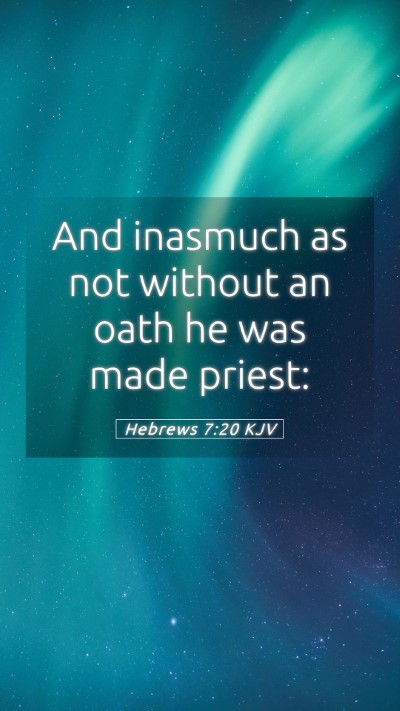Understanding Hebrews 7:20 - A Comprehensive Commentary
Hebrews 7:20 states: "And inasmuch as He was not made priest without an oath." This verse serves as a vital point in the argument presented in the Book of Hebrews regarding the priesthood of Jesus Christ compared to the Levitical priesthood. Below is a detailed exploration combining insights from various public domain commentaries.
Context of the Passage
This passage is set within a larger discussion about the significance of Jesus as a priest. The author of Hebrews is emphasizing the contrast between the Levitical priests, who were appointed without an oath, and Jesus, who was appointed with a divine oath. This distinction is critical for understanding the superiority of Christ's priesthood.
Insights from Matthew Henry
Matthew Henry emphasizes that the priesthood of Jesus is established on the basis of a divine promise, making it immutable and powerful. He notes:
- The Importance of Oath: Henry highlights the importance of an oath in establishing the certainty of Jesus' high priesthood. An oath signifies God's commitment, contrasting with the Levitical succession that depended merely on lineage.
- Better Promises: He points out that Jesus acts as a priest based on better promises, indicating that His intercession is more effective than that of the Levitical priests.
Albert Barnes' Commentary
Albert Barnes offers a detailed analysis regarding the implications of the oath in this verse:
- Spiritual Authority: Barnes asserts that the oath signifies the divine authority of Christ's priesthood, which is essential for believers to recognize the legitimacy of His role as our mediator.
- Enduring Priesthood: He notes the transformative nature of Christ's priesthood, stating that it provides a permanent solution for sin, unlike the temporary measures of the Levitical system.
Adam Clarke's Interpretation
Adam Clarke’s commentary focuses on the theological implications of this verse:
- Divine Confirmation: Clarke underscores that Christ’s appointment was divinely confirmed through an oath, giving assurance to believers about the efficacy of His mediatorial work.
- Contrast to Levitical Priests: He draws attention to the inadequacies of the Levitical priests; they lacked the authority that comes from divine endorsement, which Jesus possesses.
Theological Significance
This verse encapsulates several key theological themes:
- Superiority of Christ: Christ’s priesthood is highlighted as superior due to the divine oath, emphasizing His unique role in salvation.
- Covenantal Context: The affirming oath ties directly to the New Covenant, signifying that believers are participants in a promise that is secure and everlasting.
Applications for Today's Believers
Understanding this verse provides several practical applications for modern Christians:
- Confidence in Christ: Knowing that Jesus’ priesthood is established with an oath allows believers to have great confidence in His intercessory work.
- Encouragement in Trials: As followers navigate challenges, the assurance of Christ's eternal access to the Father through His priesthood serves as a source of hope.
Related Cross References
This verse connects with several key passages:
- Psalm 110:4: "The Lord has sworn and will not change His mind: 'You are a priest forever, in the order of Melchizedek.'
- Hebrews 5:6: "And He says in another place, 'You are a priest forever in the order of Melchizedek.'
- Hebrews 7:17: "For it is declared: 'You are a priest forever in the order of Melchizedek.'
Conclusion
Hebrews 7:20 provides profound insights into the nature of Christ’s priesthood as confirmed by God through an oath. This understanding not only enriches the Bible verse meanings and Bible verse interpretations of this scripture but also serves as a cornerstone for the believer’s faith in the New Covenant established through Jesus Christ.
As believers explore Bible study insights and engage with theological resources, recognizing the implications of this verse can lead to deeper Bible study lessons and more fruitful Bible study discussions within Bible study groups or online Bible study.


